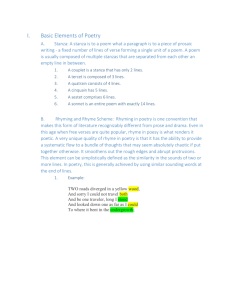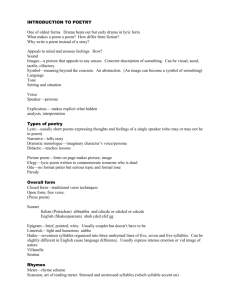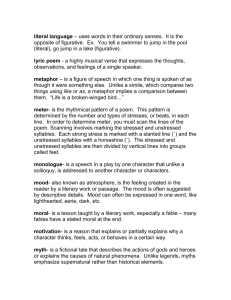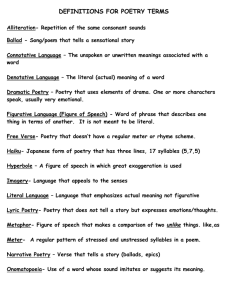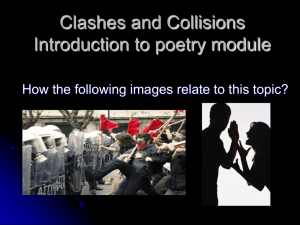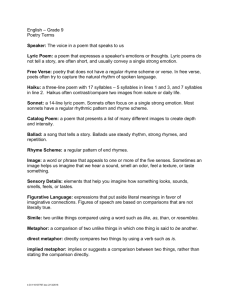Literary Poetry Term definitions
advertisement
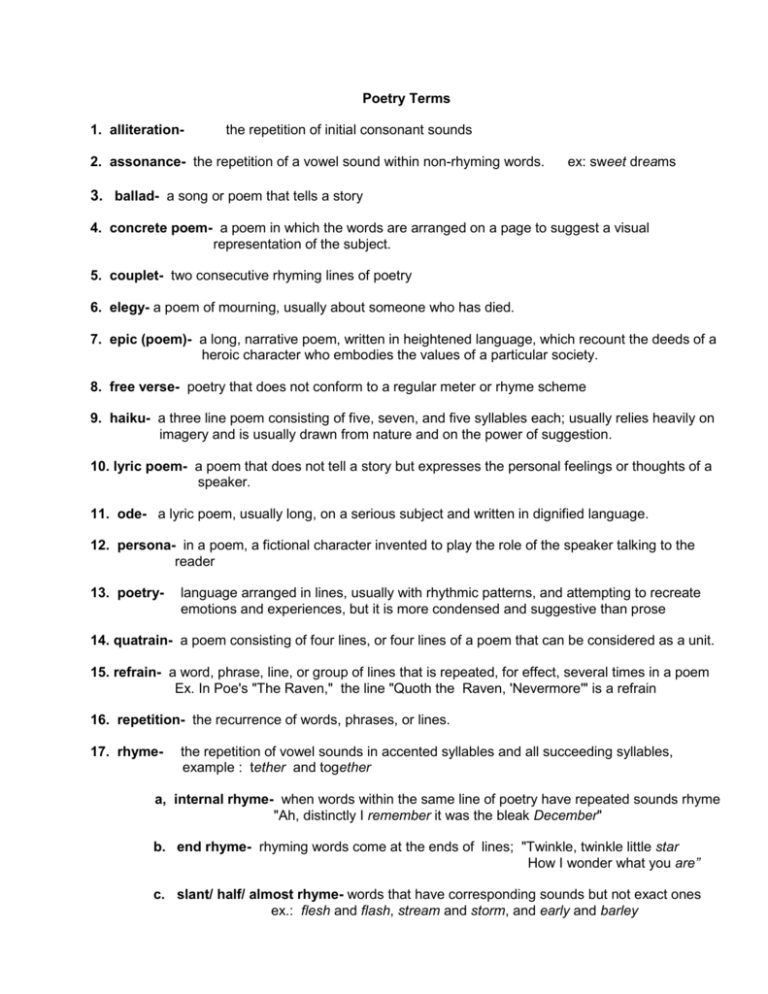
Poetry Terms 1. alliteration- the repetition of initial consonant sounds 2. assonance- the repetition of a vowel sound within non-rhyming words. ex: sweet dreams 3. ballad- a song or poem that tells a story 4. concrete poem- a poem in which the words are arranged on a page to suggest a visual representation of the subject. 5. couplet- two consecutive rhyming lines of poetry 6. elegy- a poem of mourning, usually about someone who has died. 7. epic (poem)- a long, narrative poem, written in heightened language, which recount the deeds of a heroic character who embodies the values of a particular society. 8. free verse- poetry that does not conform to a regular meter or rhyme scheme 9. haiku- a three line poem consisting of five, seven, and five syllables each; usually relies heavily on imagery and is usually drawn from nature and on the power of suggestion. 10. lyric poem- a poem that does not tell a story but expresses the personal feelings or thoughts of a speaker. 11. ode- a lyric poem, usually long, on a serious subject and written in dignified language. 12. persona- in a poem, a fictional character invented to play the role of the speaker talking to the reader 13. poetry- language arranged in lines, usually with rhythmic patterns, and attempting to recreate emotions and experiences, but it is more condensed and suggestive than prose 14. quatrain- a poem consisting of four lines, or four lines of a poem that can be considered as a unit. 15. refrain- a word, phrase, line, or group of lines that is repeated, for effect, several times in a poem Ex. In Poe's "The Raven," the line "Quoth the Raven, 'Nevermore'" is a refrain 16. repetition- the recurrence of words, phrases, or lines. 17. rhyme- the repetition of vowel sounds in accented syllables and all succeeding syllables, example : tether and together a, internal rhyme- when words within the same line of poetry have repeated sounds rhyme "Ah, distinctly I remember it was the bleak December" b. end rhyme- rhyming words come at the ends of lines; "Twinkle, twinkle little star How I wonder what you are” c. slant/ half/ almost rhyme- words that have corresponding sounds but not exact ones ex.: flesh and flash, stream and storm, and early and barley d. rhyme scheme- the pattern of end rhymes in a poem; charted by assigning a letter of the alphabet to each rhyming sound 18. rhythm- The alternation of stressed and unstressed syllables in language; used to bring out the musical quality in language, to emphasize ideas, to create mood, and to reinforce subject matter. a. meter- the regular pattern of stressed and unstressed syllables found in some poetry b. foot- each rhythmic unit, has one stressed syllable (`) and either one or two unstressed syllables ( ). ** metrical feet are: iamb (an unstressed followed by a stressed syllable) trochee (a stressed syllable followed by an unstressed syllable) anapest ( two unstressed syllables followed by a stressed syllable) And dactyl (a stressed syllable followed by two unstressed syllables) ***The Number of feet in a line is indicated by the use of the following terms: monometer (one foot), diameter (two feet), trimeter (three feet), tetrameter (four feet), pentameter (five feet), hexameter (six feet), etc. c. iambic pentameter- the most common form of meter in English poetry ex. Anne Bradstreet's "To My Dear And Loving Husband": "If ev] er man ] were loved ] by wife ] then thee" 19. sonnet- a fourteen-line poem, usually written in iambic pentameter, that has one of two basic structures. Petrarchan sonnets (Italian) have an octave asking a question or posing a problem with the rhyme scheme abba abba, which is then followed by the sestet responding to the problem/question with a rhyme scheme of cde cde. Shakespearean sonnets (English) have three quatrains concluding with a couplet with the common rhyme scheme of abab, cdcd, efef, gg. 20. stanza- a group of lines that form a unit in a poem; usually characterized by a common pattern of meter, rhyme, and number of lines a. triplet- three lines in a stanza b. sestet- six lines in a stanza, especially the last six lines of a Petrarchan, or Italian, sonnet c. octet/ octave- eight lines in a stanza/ an eight line poem, or the first eight lines of a Petracrchan, or Italian, sonnet. Poetry Terms (30 words total) 1. alliteration- 16. repetition 2. assonance- 17. rhyme- 3. ballad- a. internal rhyme- 4. concrete poem- b. end rhyme- 5. couplet- c. slant/ half/ almost rhyme- 6. elegy- d. rhyme scheme- 7. epic (poem)- 18. rhythm- 8. free verse- a. meter- 9. haiku- b. foot- 10. lyric poem- c. iambic pentameter- 11. ode- 19. sonnet- 12. persona (look under “speaker”)- 20. stanzaa. triplet 13. poetryb. sestet 14. quatrain- 15. refrain- c. octet/ octave
